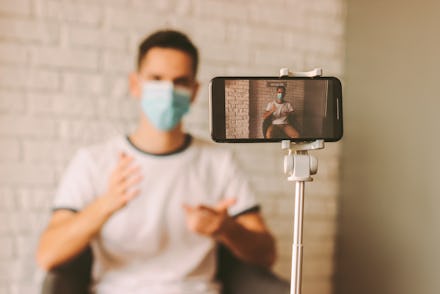Dozens of coronavirus documentaries are already in the works

The spectre of coronavirus is everywhere, tailing us wherever we go. The pandemic is all anyone can think about or talk about. It dominates the news, minimizing lots of other major happenings, like natural disasters and the impending presidential election.
Filmmakers are similarly captivated by the virus. According to Vulture, there are at least 20 coronavirus-related documentary projects in development right now, meaning COVID-19 will keep commanding our attention long after this is all over, unfortunately.
The spate of coronavirus documentaries are being helmed by some big names. Ron Howard is shooting a film for National Geographic about chef José Andrés’s humanitarian organization, World Central Kitchen. British journalist and documentarian Lucy Sherriff is spearheading a crowdsourced, global vlogging project to holistically document “one of the most important events that is going to happen in our lifetime.”
Get Me Roger Stone producer Jihan Robinson is working on a pandemic series for Quibi. Acclaimed storytellers like Liz Garbus (What Happened, Miss Simone?), Laura Nix (Inventing Tomorrow), Janet Tobias (No Place on Earth), Drea Cooper (Flint Town) and David France (How to Survive a Plague) all have COVID-related projects in the works, too.
Emmy-winning and Oscar-nominated filmmaker Matthew Heineman (Cartel Land) is several weeks into shooting a coronavirus documentary, executive-produced by Academy Award-winner Alex Gibney. He said he became “completely obsessed” with the crisis as it grew from an isolated outbreak to a global pandemic.
“I felt like it is the most important story of my lifetime,” Heineman told Vulture. “So I set out to embed within hospitals in New York City and put a human face to the amazing, heroic, heartbreaking work that doctors and nurses and administrators here are doing. How they are fighting 24 hours a day, seven days a week. How they are navigating through uncharted waters without even blinking. How they are doing everything they can to keep people alive.”
Shooting a doc about a deadly virus is obviously a risky endeavor. Heineman has embedded with vigilantes fighting the Mexican drug cartel and citizen journalists exposing the atrocities perpetrated by ISIS in Syria, but he called developing his COVID-19 project the “hardest thing I’ve ever done in my life.”
“One of the most insidious and difficult parts of making a film like this is [the coronavirus] is omnipresent. It’s around you at all times. It’s invisible, so you can’t escape it. You can’t let your guard down. You can’t ever stop thinking about it,” Heineman told Vulture.
Filmmakers are adopting precautionary measures to protect their crews from the virus, opting to interview subjects via Zoom or FaceTime instead of in-person and figuring out how to hand off footage without transmitting germs.
“There are all these little, tiny practical things,” filmmaker Laura Gabbert (City of Gold, Netflix’s Ugly Delicious) told Vulture. “I have camera people out in the field, shooting from a safe distance, shooting shuttered restaurants, all with a safety protocol in mind. How do you get the footage somewhere safely? I’ve been getting [hard] drives from my DP. He leaves it at my door. We let it sit for a couple of days. We sterilize it. There’s a new protocol for everything.”
But when the pandemic is over, will people actually want to relive it so soon? “I’ve heard the argument that no one is going to want to watch something about COVID when this is over,” Gabbert acknowledged. “I don’t believe that. [My movie] is about the economics of restaurants, the supply chain. It’s about the personal stories, the hopes and fears, of people being resourceful and adaptive while other people are closing up shop. It’s such a human story.”
Heineman told Vulture he considers documenting the pandemic a public service. “I’m not trying to race and make the film that comes out first,” he said. “I’m looking to make a film that hopefully stands the test of time. It’s so great that there are a lot of filmmakers and journalists and storytellers of all shapes and sizes telling this story. It’s imperative we tell this story. It’s imperative we tell this story in different ways.”